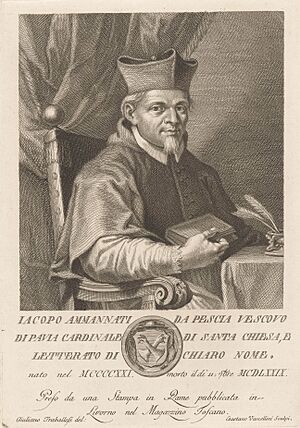Jacopo Piccolomini-Ammannati facts for kids
Jacopo Piccolomini-Ammannati (born March 8, 1422 – died September 10, 1479) was an important Italian Renaissance figure. He was a cardinal, which is a high-ranking official in the Catholic Church, and a humanist, meaning he loved learning and classical studies. He was also known as Giacomo Piccolomini.
Contents
Who Was Jacopo Piccolomini?
Jacopo Piccolomini-Ammannati was born in a town called Pescia, which is in Italy today. He was related to the powerful Piccolomini family from Siena. He studied literature and theology in Florence, a famous city for art and learning.
Early Career in Rome
Jacopo moved to Rome when Pope Nicholas V was in charge. For a while, he lived in great poverty. In 1450, he became a private secretary to Cardinal Domenico Capranica. Later, Pope Callixtus III made him a Secretary of Briefs. This meant he helped write important letters and documents for the Pope.
Becoming a Bishop and Cardinal
Pope Pius II kept Jacopo in his role as Secretary of Briefs. He also made Jacopo part of his personal staff. At this time, Jacopo took the family name Piccolomini.
In 1460, Pope Pius II made Jacopo the Bishop of Pavia. He became one of Pius II's most trusted friends and advisors. Even when he was away, Jacopo made sure his diocese was well-managed. He stayed in touch with the people who helped him.
On December 18, 1461, Jacopo Ammannati became a cardinal. He was often called the Cardinal of Pavia. He was with Pope Pius II when he died.
Challenges with Popes
After Pius II, Jacopo helped elect Pope Paul II. However, he later had disagreements with Paul II. He also faced difficulties with Pope Sixtus IV.
In 1470, Jacopo was moved to the bishopric of Lucca. He was also sent as a special representative of the Pope to Umbria.
A Friend of Scholars
Jacopo Ammannati was known for being a friend to students and scholars. He supported people like Jacopo de Volterra. He was also friends with important church leaders and humanists, such as Cardinal Carvajal and Cardinal Bartolomeo Roverella. Cardinal Bessarion praised Jacopo for his leadership skills, helpfulness, kindness, and dedication.
His Writings
Jacopo wrote a continuation of Pope Pius II's Commentarii (which were like a diary or memoirs). His writing style was elegant. His Commentaries are an important source for understanding history from that time. He also had many valuable letters that have been collected and published.
His Death
Jacopo Ammannati died from malaria on September 10, 1479. He passed away in a place called San Lorenzo alle Grotte, near Bolsena.
 | Misty Copeland |
 | Raven Wilkinson |
 | Debra Austin |
 | Aesha Ash |


